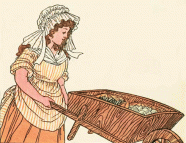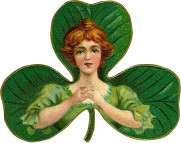Little Bit Of Heaven, A (St. Patrick's Day)
Sub-titled "How Ireland Got Her Name," lyrics by J. Keirn Brennan, music by Ernest R. Ball ("Mother Machree," "When Irish Eyes Are Smiling"). Introduced by the consummate Professional Irishman Chauncey Olcott, 1914.
Minstrel Boy, The (St. Patrick's Day)
Timeless, enduring ode to Irish independence first appearing in the classic "Irish Melodies" of Poet Laureate Thomas Moore(1779-1852). Pictured are iconic Irish patriots Charles S.Parnell, Michael Collins, Eamon De Valera and Thomas Moore himself.
Molly Malone (St. Patrick's Day)
Unknown origins, published mid-19th century, drawn from real Dublin fishmonger cry advertising fresh wares.
Mother Machree (St. Patrick's Day)
Music by Ernest Ball and Chauncey Olcott, lyrics by Rida Johnson Young, from "Barry Of Ballymore," 1911. All of the song's creators have numerous prominent credits, among them, Ball & Olcott's "When Irish Eyes Are Smiling" and Young's lyrics for "Naughty Marietta" ("Italian Street Song," "Ah! Sweet Mystery Of Life")and "Maytime" ("Will You Remember") "Machree" is a term of endearment: "my dear," "dearest"...
My Wild Irish Rose (St.Patrick's Day)
One of a number of essentially Irish-American standards by American-born Chancellor "Chauncey" Olcott(1858-1932) from his show "A Romance Of Athlone," 1899. Through his songs (also including "When Irish Eyes Are Smiling") and his classic stage persona, Olcott created the indelible image of the twinkly, broguish Irishman in American culture.
Peg O' My Heart (St. Patrick's Day)
Inspired in 1913 by the non-musical play(of the same name) starring legendary actress Laurette Taylor, billed on the sheet music as "The $1000.00 Prize Song" and dedicated to Miss Taylor. Music by Fred Fisher, lyrics by Alfred Bryan. Used in "Ziegfeld Follies of 1913," big pop standard in the late 40s.






